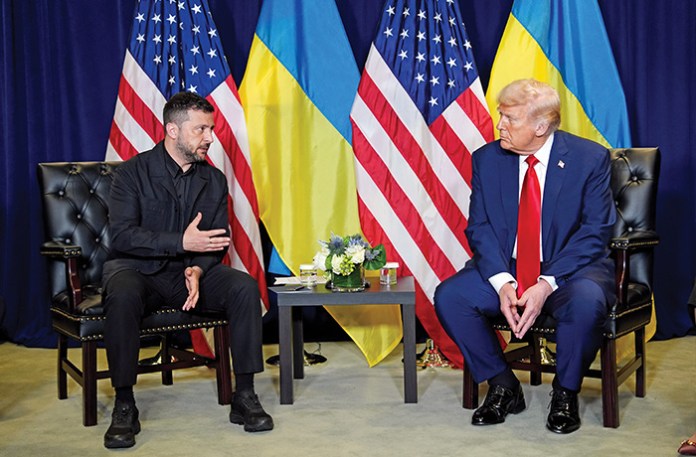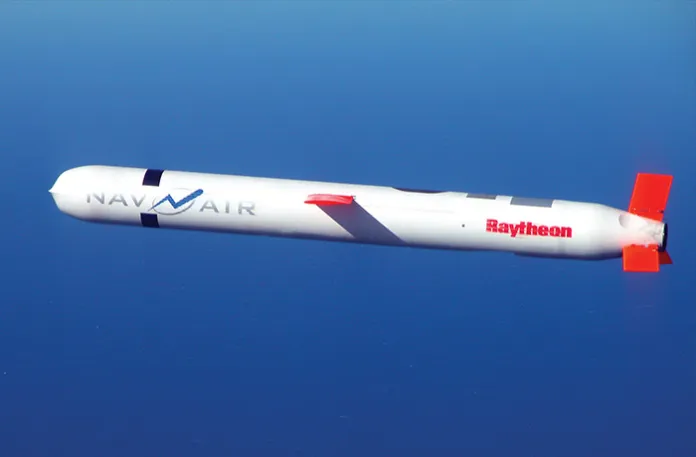President Donald Trump is a surprising man. After a meeting with Ukrainian President Volodymyr Zelensky late last month at the United Nations General Assembly, he issued a Truth Social post announcing he believes that nation “would be able to take back their Country in its original form and, who knows, maybe even go further than that!” Trump subsequently announced that he supported NATO countries shooting down Russian aircraft violating the alliance’s airspace. It seemed to be a complete shift in European security policy. Kremlin spokesmen in Moscow were thrown into apoplexy by the sudden shift, and Western analysts reacted with stunned confusion.
But perhaps his reversal should surprise the commentariat less than it has. When Russian President Vladimir Putin began his 2022 invasion, of course, Democrats sought to present Trump as sympathetic to Russian aggression and suggest that he was hostile to democracy itself. While he certainly adopted troublingly dovish rhetoric regarding Russia during his four years in the political wilderness, we would do well to remember that he sent lethal aid to Ukraine in the waning days of his first administration — in other words, taking the very steps on which the Biden administration sometimes dragged its feet. The far harder line against the aggressor nation than many expected is not so out of alignment with his earlier positions as the media suggest.
And, of course, the shift follows several weeks of changing rhetoric from the president. After a much-hyped and inconclusive meeting with Putin in Alaska, for example, Trump criticized his predecessor for doing too little to support our friends in the war. “Crooked and grossly incompetent Joe Biden would not let Ukraine FIGHT BACK, only DEFEND,” he posted on Truth Social. While the final outcome of the negotiations remains highly uncertain, many of the measures he said he was considering even before the New York pronouncements are far more hawkish than anything the prior Democratic administration pursued. That is without even mentioning the fact that he positioned two nuclear submarines to circle Russia to demonstrate American resolve ahead of the Alaska meeting. Although isolationist elements still play a sizable role in the Trump administration’s decision-making, they are only one faction among several vying for influence. And clearly, they are not winning the argument.

What, then, accounts for Trump’s change of heart? In part, Trump has grown frustrated by Putin’s intransigence, and he is clearly troubled by the despot’s continued strikes on civilian targets. Returning to the White House has taught him that ending the war in Ukraine will take longer than the days or months he promised it would during the election, and that the United States cannot negotiate a real peace deal from a position of weakness. Furthermore, he understands that his political base demands that he project confidence on the world stage — simply retreating would make him seem just as weak as his predecessor. At the most basic level, then, the president is trying to live up to his Reaganite campaign slogan: “Peace through strength.”
Trump remains highly unpredictable, of course, and his administration is fiercely divided. There is nothing to guarantee that this reversal will be permanent. Forces within the administration, apparently led by the War Department’s undersecretary for policy, Elbridge Colby, have even reimplemented Biden-era restrictions on how Ukraine can use American-made missiles. A truly coherent plan for security in Eastern Europe remains a long way off. All the same, the so-called “restrainers” within the administration are losing the debate. Trump’s Republican allies in Congress and mainstream conservatives across the movement have a serious opportunity to enact policies that will enable Ukraine to defend itself and remain a bulwark against Russia’s imperial ambitions.
As Trump’s Ukraine policy continues to develop, polling indicates that both his supporters and the broader American public support a tougher stance against Russia. Take, for instance, a recent survey conducted last month by the Vandenberg Coalition, a conservative national security organization, that found that most Trump supporters view Putin as the largest obstacle to peace in Ukraine. It also found that vast majorities of this partisan core and the wider public see Russia as a threat to American security. And it found that, since the summit in Alaska, the number of Trump voters in favor of exerting more pressure on the Kremlin to force it to the negotiating table has grown to 80%.

The Vandenberg Coalition poll clearly demonstrates that the “restrainers” and isolationists in the right-wing establishment have lost the plot. While there is no doubt Americans are weary of war and conflict, they understand that the West’s enemies are on the march and must be stopped. They have not fallen for the Russian propaganda laundered through the New Right’s influencer-industrial complex because they remain committed to the conservative axiom that peace comes only through strength. According to the poll, 87% of Trump voters under 30, supposedly the most anti-war demographic, believe the U.S. must be stronger than China, Iran, and Russia, and only 6% believe America is being dragged into too many foreign wars. It does not take an advanced degree in geopolitics or international relations to understand that Putin’s aggression is aimed at knocking the U.S. from its place at the top of the world order — it just takes common sense.
This polling also proves how misguided it is to interpret the 2024 election as a mandate to retreat from global leadership. The Democrats lost in no small part because President Joe Biden did not conduct his foreign policy with a “peace through strength” mindset. It began with his shameful retreat from Afghanistan, which signaled a complete lack of will to maintain American power against the aggression of our enemies. And while he may have provided a certain level of rhetorical support to beleaguered Ukraine after Putin’s invasion began, he never quite provided the kind of aid that would have enabled it to win the war, as Republicans such as Sen. Tom Cotton (R-AR) and Rep. Don Bacon (R-NE) have pointed out since it first began. The people simply lost confidence in Biden’s ability to respond to serious national security threats, and so they turned to a man who promised to use American power to defend our interests.
Unfortunately, however, there are some in the new Trump administration who still do not understand this dynamic.
What unites the Democrats’ national security strategy with the Republican restrainers’ — and distances both from the public — is a fundamental sense that America is an empire in decline. The lesson these camps learned from the global war on terrorism is that the U.S. cannot win anymore and, therefore, should retreat from its obligations to allies and the post-World War II security architecture that put America atop the international order in the first place. This, of course, is the exact opposite of the lesson President Ronald Reagan taught the world when he achieved victory in the Cold War. He knew that demonstrating resolve and building up sources of real military strength could deter America’s enemies without necessarily firing a single shot. He set his face against the declinists of his day, and Trump would be wise to do so as well.

That said, the strongest argument the “restrainer” camp makes for a more limited American foreign policy boils down to resources. Colby and others contend that the U.S. simply does not have the arms, ammunition, or manpower to fight every enemy in every region all the time. Fair enough. But while it is no doubt true that the Pentagon faces major resourcing challenges, simply giving up in the face of them would be a total rejection of the “peace through strength” motto Trump seeks to make his own. Pentagon policy planners should not be content with whining about limited resources. They should be working overtime to secure supply chains, ramp up production, and demonstrate to watching enemies that the U.S. can and will defend its interests, even in a more dangerous world.
Partly, it seems, the declinists in both administrations believe that they simply cannot convince the public to get behind a true “peace through strength” strategy. But once again, the Vandenberg Coalition’s polling demonstrates otherwise. Although foreign policy issues are complex and rarely drive elections by themselves, the public, and especially the Republican Party’s conservative base, understands the fundamentals of geopolitics far better than the Washington elite gives them credit for. Not only do the polls show that Americans recognize the threats posed by Russia, Iran, and China, but they also prove they understand just how interlinked those enemy regimes truly are. Fully 92% of Trump voters said it was important to prevent Iran’s Russian- and Chinese-backed nuclear program from developing a bomb, for example, and increasingly large majorities ranked all three rogue regimes as major threats to our security.

All this means that Trump has an opportunity to frustrate the restrainers seeking to limit his options, baffle the liberals who never understood him, and use his bully pulpit to promote a real “peace through strength” strategy for keeping America and its allies secure. His Truth Social post and comments to the media in New York are excellent first steps, but a more focused approach is necessary to maintain momentum. An Oval Office address on the nature of Russian aggression, for example, would build more support for the tougher strategy Trump has recently adopted. Or some comments about Putin’s total intractability at a political rally could awaken the base to the fundamental disrespect the Russian president has shown toward the U.S. Trump could pair this enhanced rhetoric with a series of policies designed to drag Putin to the negotiating table, from lifting shortsighted restrictions on Ukrainian use of American weapons to sanctioning the Russian economy.
If Trump does not follow through on a popular “peace through strength” approach, though, he is in danger of appearing like a weak leader and alienating his base. Recent reporting from Politico indicates that the draft “National Security Strategy” currently under review by War Secretary Pete Hegseth charts a course of retreat from the world stage. Instead of prioritizing competition against China, Russia, and Iran, the document allegedly advocates cutting and running from our commitments to allies. While it is certainly important to defend American interests vigorously in our own hemisphere, that cannot come at the expense of outcompeting great power enemies. Not only would that be strategically foolish, but it would also cut against the preferences of Trump’s voters. The Vandenberg Coalition poll found that 90% believe the world is safer when America leads — they do not support Biden-style retreat, and endorsing an isolationist NSS written by Pentagon elites would be a betrayal of their instincts.
By contrast, the recent success of Operation Midnight Hammer’s strikes on Iran provides an excellent case study in how supportive voters are when Trump acts with strength and determination on the global stage. Isolationist commentators on the Right, from Candace Owens to Tucker Carlson, condemned the strikes as “utterly deranged” and hysterically warned that they would bring on World War III and break Trump’s supposedly anti-war coalition. Far from breaking Trump’s support, though, the base loved the president’s decisiveness. The Vandenberg Coalition’s polling shows that 93% of those who voted for Trump supported Operation Midnight Hammer and 86% continue to approve of his foreign policy more broadly.
The public is clearly far more receptive to the old Reaganite strategy Trump has taken in recent months because it grows out of common sense. Bidenesque appeasement does not lead to peace — it only emboldens the enemies of the free world, enabling them to build up strength and advance against our interests. Confronting and deterring them, however, makes everyone safer. Much like the killing of Iranian terrorist leader Qassem Soleimani in Trump’s first term, acting against Tehran’s nuclear aggression actually de-escalated the situation in the Middle East. The same logic applies to Russia and Communist China, both autocratic regimes inextricably linked to the Islamic Republic in an “axis of aggression.” Americans are exhausted and frustrated by the last four years of kowtowing before these enemy powers, and they will sleep more easily at night if their commander in chief gets serious about putting the aggressors in check.
In his own time, Reagan cited Winston Churchill, a man conservatives have hailed as “common sense incarnate,” to explain the meaning of “peace through strength.” In his 1964 A Time For Choosing address, the future president recalled the former prime minister’s courageous stance against totalitarianism to rally support behind a thoroughly anticommunist strategy. “You and I have the courage to say to our enemies, ‘There is a price we will not pay.’ ‘There is a point beyond which they must not advance,’” Reagan proclaimed, before going on to quote from a speech Churchill gave during Britain’s darkest hour: “The destiny of man is not measured by material computations. When great forces are on the move in the world, we learn we’re spirits — not animals.” For Reagan and Churchill, “peace through strength” meant refusing to allow the West’s enemies to determine the course of history, and that decline is a choice, not an inevitability. That is a lesson the isolationists opposed to Trump’s recent decisions must learn and that his supporters clearly understand already.
THE HOUTHIS TRUCE IS A STRATEGIC MISTAKE
Of course, Trump is not the only one who should be encouraged by the Vandenberg Coalition poll numbers. Conservative members of Congress should also take heart. Although a vocal minority of populists in the body continue to promote a vapid isolationism, an overwhelming majority of Republicans and Democrats continue to support strong relationships with America’s allies. This summer, for instance, the House defeated an effort to cut Ukraine funding by a margin of 353-76. Members have no need to hide from this record. The public clearly is on the side of the majority. Those who are worried about primary candidates outflanking them on the issue need to put more trust in the people and more effort into messaging directly to voters on national security. They should take advantage of Trump’s more sympathetic stance toward the Ukrainians to build up even more support.
But the effort to put the isolationists, declinists, and restrainers out in the cold must continue by standing up to Russia. Ideological echo chambers online already do not reflect genuine public sentiment, and the Democrats’ attempts to polarize the issue negatively have failed, at least so far as public opinion is concerned. Standing firm on supporting Ukraine would be a truly shocking way for Trump to show the world that America will back its allies when they come under fire. Americans would love it, and our enemies the world over would think twice about threatening us or our friends. It would be a true return to “peace through strength.”
Michael Lucchese is the founder of Pipe Creek Consulting, an associate editor of Law & Liberty, and a contributing editor to Providence.
